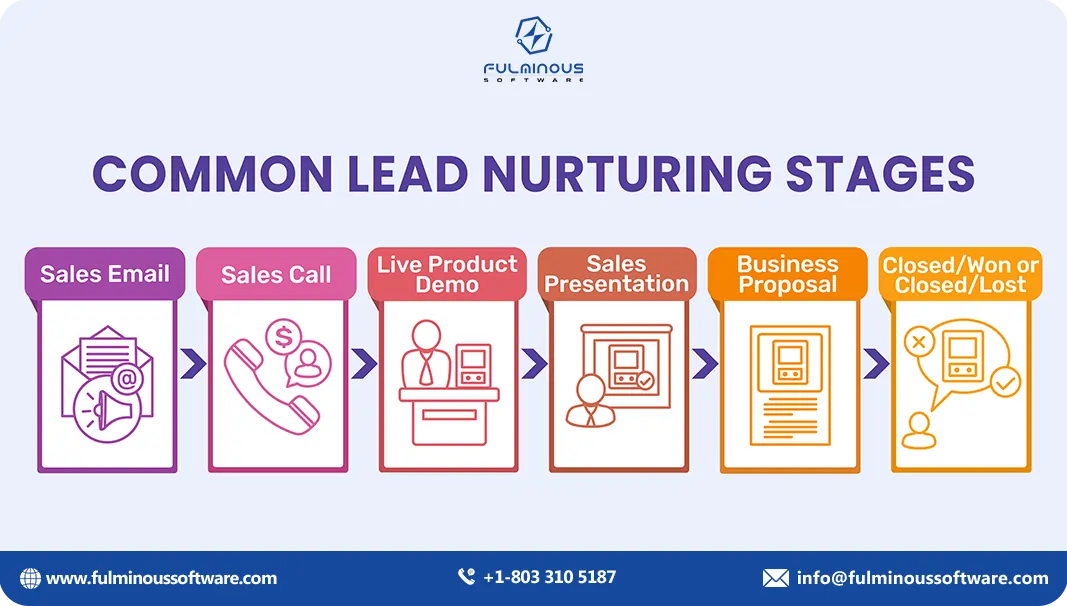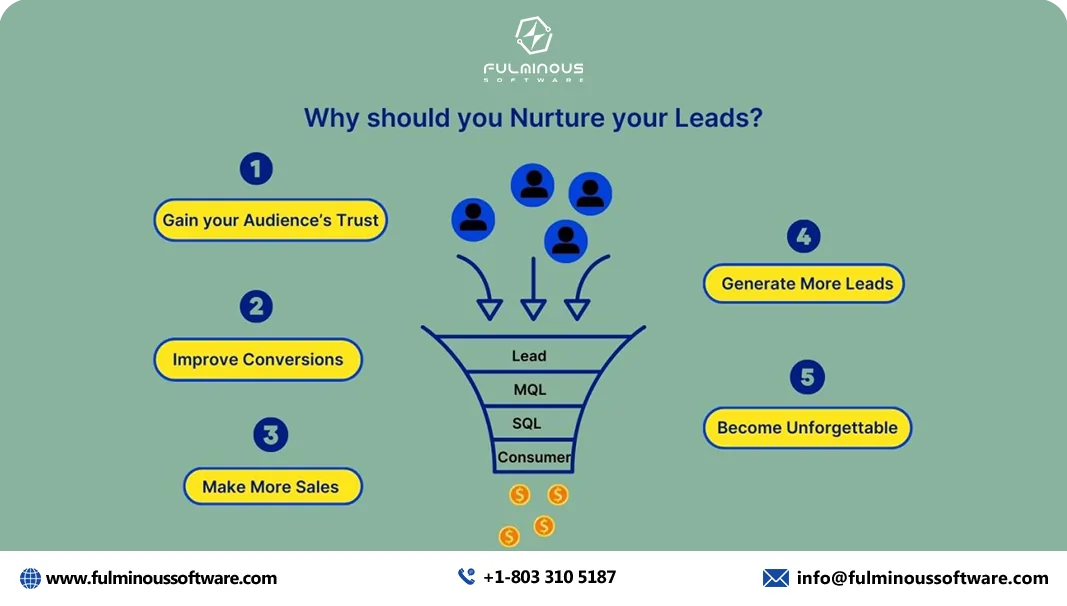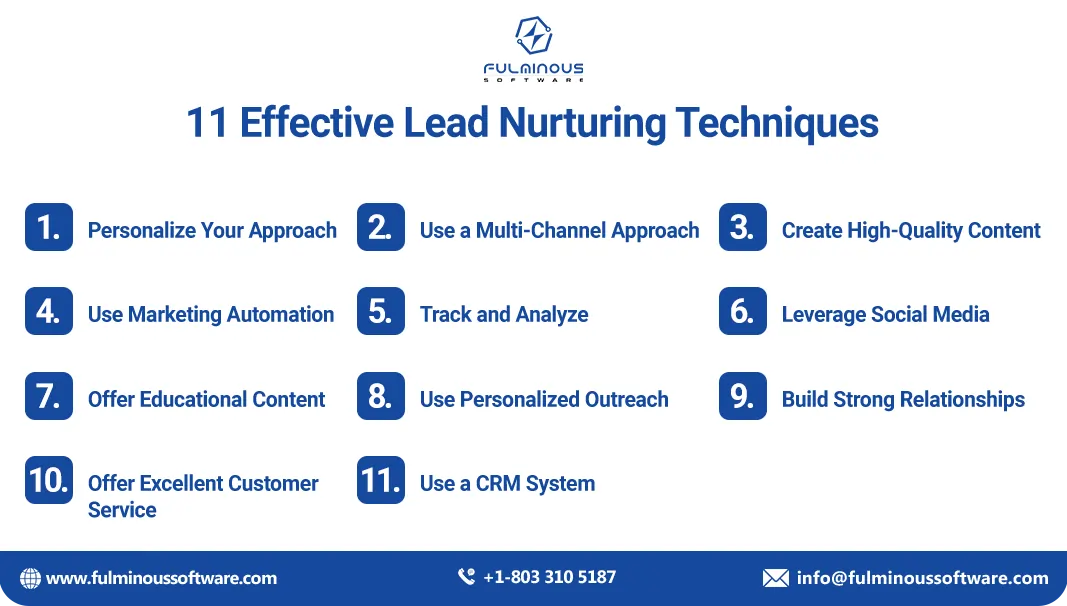Effective Lead Nurturing Techniques for B2B Manufacturing
Manish Kumawat
Last Updated on: 07 October 2025
The journey and time period between sowing a seed and harvesting the fruit is very important. Prosperous harvesting is only possible when you act properly during this period which is called nurturing. Proper nurturing with patience is the ideal way to act.

Similarly, when you have a hot lead on the line, Great job! But now what? Just like you wouldn't leave a seed under soil without a little care, you can't just leave that lead hanging. You gotta nurture it! If you have a lead, you need to know more about them, and their need, clear their confusion, and give them clarity.
As an example, imagine that you're a car lover who wants to purchase a vintage car. You're excited, right? But you wouldn't just buy it on an assumption. You'd probably do some research, maybe take it for a spin, and ask a mechanic's opinion. That's exactly how your potential customers feel about your products. They require information and assurance.
Especially in the manufacturing industry, you need a special set of strategies to nurture leads and convert them to loyal customers. So, here we'll share 14 tips to help you nurture your manufacturing leads, turning them from curious onlookers into loyal customers. Let's get started!
What is Lead Nurturing?

Lead Nurturing: The Art of Building Relationships
Just like a gardener tending to a delicate plant, lead nurturing has various dimensions. You wouldn't just water it once and expect it to provide flowers and fruits, right? You'd nurture it with the right amount of sunlight, water, and nutrients, guiding it towards its full potential.
Building relationships with future clients is known as lead nurturing in the B2B manufacturing industry. It's about more than just a quick sales pitch. It's about building trust, providing value, and guiding your leads through their buyer's journey.

For example, imagine you have a manufacturing business of automobile machinery. You might start by sending a potential customer a whitepaper on the latest industry trends. Then, you could follow up with a personalized email, offering to schedule a virtual demo of your newest product. By providing valuable content and tailored interactions, you're nurturing that lead and positioning your company as the go-to solution.

Why Lead Nurturing Matters for Manufacturers
In today's competitive B2B manufacturing landscape, simply generating leads isn't enough. You need to nurture those leads to turn them into loyal customers. Good lead nurturing is like a well-oiled machine, ensuring that every lead is given the attention and care it deserves.

- Building Trust: Lead nurturing helps manufacturers make people trust them. When they share helpful information, people feel more comfortable with them.
- Better Relationships: It lets manufacturers stay in touch with people. This helps them build strong connections, which can lead to more business.
- Turning Interest into Sales: Sometimes, people show interest but aren’t ready to buy. Lead nurturing keeps them interested until they’re ready to make a purchase.
- Learning What Customers Need: By talking to leads often, manufacturers learn what customers want and need. This helps them offer better products.
- Standing Out from Others: When manufacturers take time to nurture leads, they show they care. This makes them stand out from competitors who don’t do the same.
A well-nurtured lead is more likely to become a repeat customer and a brand advocate, driving referrals and boosting your bottom line.
See Some Stats (Source)
- Effective lead nurturing helps businesses produce 50% more sales-ready leads at a 33% lower cost.
- Lead nurturing has not yet been adopted by 65% of marketers.
- 52% of marketers make plans for their lead nurturing tactics for the upcoming year.
- Lead generation is the biggest marketing difficulty for 37.1% of firms.
- 48% of marketers believe that their lead nurturing programs need to be improved.
11 Effective Lead Nurturing Techniques
Here are 11 techniques to help you nurture your manufacturing leads effectively:

1. Personalize Your Approach
Remember that your leads are not the same. So, a generalized approach will lead to conversion failure. Customers feel that they’re cared for and are more likely to trust the company and keep coming back.
First, manufacturers need to understand who they’re talking to. This means they should learn what their customers need, what problems they have, and what they like. For example, some customers might need fast deliveries, while others care more about product quality.
Once manufacturers know their audience, they can make special content just for them. This content could be helpful tips, videos, or guides that focus on what each customer needs. For example, if a customer cares about saving money, the manufacturer might share tips on using products more efficiently.
Instead of sending the same message to everyone, manufacturers can make each message feel personal. This means using the customer’s name and talking about things they’ve asked about before. If a customer had questions about a certain machine, the manufacturer could send them updates or helpful tips on using it.
2. Using Different Ways to Stay in Touch
For manufacturers, lead nurturing means building strong friendships with people who might buy from them someday. A “multi-channel approach” means using many ways to talk to people, so they remember the company. When manufacturers use different ways to connect, they keep people interested and show they know a lot about what they do.
Manufacturers can send helpful emails to people who might buy from them. Email marketing is the ideal marketing strategy in today’s digital world. These emails can include news about what’s happening in the industry, new product updates, or stories of how other people have used their products. These emails keep everyone updated and show how the manufacturer can help.
Manufacturers can also use sites like LinkedIn and Twitter to talk to people. They can share posts about their products, helpful articles, or tips for using their products better. When they reply to comments and messages, it makes people feel friendly toward the company.
Hosting online events like webinars or workshops is another good way for manufacturers to reach people. In these events, they can teach about new trends or show how to use their products. This makes customers see the company as an expert and learn important information.
Sending a physical letter or brochure can feel special. Manufacturers can mail personalized letters or brochures to their leads. By using all these ways—email, social media, online events, and mail—manufacturers show they care about their customers and are there to help. This mix of ways helps manufacturers stay in people’s minds and build strong connections.
3. Creating Great Content to Help People
For manufacturers, lead nurturing means helping people who might buy from them one day by sharing useful information. This content can teach people, answer their questions, and show that the manufacturer really knows their stuff.
Manufacturers can write simple articles to answer common questions and share helpful tips. For example, they might write about how their products work or what’s happening in their industry. These articles give people useful information and help them understand things better.
Sharing success stories, or case studies, is another way to show the value of products. These stories explain how the manufacturer’s products helped other customers solve problems. By reading these, new customers can see how the products could help them too. Sometimes, it’s easier to understand something when it’s shown in pictures. Infographics are colorful graphics that explain information in a simple, visual way. Videos are also a great way to show how products work, explain features, or give quick lessons.
By creating these types of content, manufacturers make learning easy and keep people interested in their products. This shows they care and want to help customers make smart choices.
4. Using Automation to Help Stay in Touch
For manufacturers, lead nurturing means building good relationships with people who might want to buy from them someday. One way to do this is by using marketing automation, which means setting up systems that can send messages or keep track of leads automatically.
Manufacturers can set up automated emails to send helpful messages to people at different stages of interest. For example, if someone is just learning about the company, they might get an email introducing the products. If someone is closer to buying, they might get a special offer or more product details. Automation means these emails go out on their own, so manufacturers don’t have to send each one manually.
Manufacturers can use a lead scoring system to give points to people based on what they do—like visiting the manufacturing website, reading an email, or asking questions. People with more points are likely more interested in buying, so manufacturers can focus on talking to these people first.
Workflow automation makes the whole lead nurturing process easier and faster. Instead of doing everything by hand, manufacturers can set up automatic steps that happen without much effort. For example, if someone signs up to learn more about a product, they might automatically get a welcome email, a product guide, and a follow-up message over time.
Using automation helps manufacturers keep in touch with their leads, even when they’re busy. It saves time and makes sure no one gets forgotten.
For manufacturers, lead nurturing is about building strong relationships with people who might buy from them one day. To make sure they’re doing a good job, manufacturers can track and analyze what’s working and what’s not.Manufacturers can look at important numbers, or “KPIs,” to see how well they’re doing. For example, they might track how many people open their emails, click on links, or decide to buy something (conversion rates). These numbers show which parts are working well and which parts might need some fixing.
5. Keeping Track to Get Better
A/B testing is like a little experiment. Manufacturers can try two different approaches—maybe two types of email designs or two different messages—and see which one people like more.
Tracking and testing help manufacturers learn from their results. By looking at the data, they can see what works best and keep getting better. If they notice that one type of message gets more clicks or a certain topic gets more attention, they can focus more on those things.
By watching these results, manufacturers can make smarter choices about how to talk to their leads. Tracking and improving make sure the company is always learning and doing its best to connect with potential customers.
6. Using Social Media to Connect with People
For manufacturers, lead nurturing means building good connections with people who might buy from them one day. Social media is a great way to do this because it helps companies talk to many people at once.
Manufacturers can post helpful and interesting things on social media, like articles, infographics (which are colorful pictures that explain things simply), and videos. For example, they might share a video showing how their product works or an article about new trends in their industry.
Social media is also a place where manufacturers can talk directly with their audience. They can reply to comments and answer questions people ask. If someone leaves a comment or sends a message, the company can respond quickly, which makes people feel valued and important.
Manufacturers can also run special promotions, called campaigns, on social media. These campaigns help show off their products or services. For example, they might create a special offer or highlight a new product with a cool post or ad.
Targeted campaigns make sure their posts reach the right people, who might be interested in buying. Using social media in these ways helps manufacturers stay in touch and build stronger relationships.
7. Attracting People with Helpful Content
For manufacturers, lead nurturing means building a good relationship with people who might buy from them one day. One great way to do this is by offering educational content.
Manufacturers can host online events called webinars and workshops. In these events, they talk about important topics in their industry, like new trends or smart ways to use products. People can join these events online and learn directly from the experts. It shows the manufacturer is knowledgeable and ready to help.
Ebooks and whitepapers are detailed resources that give a lot of information. For example, an ebook could cover the best ways to use a product, or a whitepaper might explain why a certain product is helpful.
A product demo is when a manufacturer shows how their product works in real life. By offering personalized demos, they can help each person see how the product would fit their needs. People can ask questions and get a close-up look at the product.
Offering educational content helps manufacturers build trust with their audience. By sharing webinars, ebooks, and product demos, they show that they care about helping people understand their products and make smart choices.
8. Reaching Out in a Personal Way
For manufacturers, lead nurturing means building strong connections with people who might buy from them in the future. One way to do this is with personalized outreach, which means reaching out in a way that feels special and direct. This can help people feel important and make them more interested in the company. Here’s how manufacturers can do it:
Manufacturers can send emails that feel personal and are made just for certain groups of people. Instead of sending the same email to everyone, they can create different messages for different people. For example, they might send one type of email to new leads and a different one to people who are already close to buying. These emails show people that the company cares about their unique needs.
Sometimes, sending a physical letter or brochure can make a big impact. Manufacturers can mail special letters or product brochures to people who seem especially interested, called “high-value leads.” Receiving a letter or brochure in the mail feels special and helps people remember the company and its products.
Another way to reach out personally is by making a phone call. Manufacturers can call people who have shown interest to answer questions and share more about their products. A phone call feels very personal, and it gives people a chance to ask anything they’re curious about.
Using personalized outreach shows people that the manufacturer cares about them individually. By sending targeted emails, direct mail, and making phone calls, manufacturers build stronger relationships and help people feel valued. This kind of outreach makes it more likely that people will trust the company and consider buying from them in the future.
9. Building Strong Relationships with Customers
For manufacturers, lead nurturing means creating a good relationship with people who might buy from them in the future. Building strong relationships helps people feel connected, understood, and valued. Here’s how manufacturers can do it:
One important part of building relationships is listening carefully. This means listening to their needs, concerns, and questions. By really listening, manufacturers can learn what matters most to each customer and respond in ways that make sense for them.
Manufacturers can show empathy by understanding the challenges that customers face. For example, if a customer is having a hard time finding a solution, the manufacturer can show they care by offering helpful advice. Empathy makes people feel like the manufacturer truly cares about them and their problems.
Trust is very important in any relationship. To build trust, manufacturers should always be honest and clear when talking to their customers. This means sharing real information and being transparent, or open, about how things work. For example, if a product will take a little longer to deliver, the manufacturer should tell the customer right away. Being trustworthy shows that the company is dependable, and it helps customers feel safe.
By focusing on active listening, respecting their views, empathy, and trustworthiness, manufacturers can build strong relationships with their leads. This makes people feel valued and more likely to buy from the company one day. When customers feel understood and trust the manufacturer, they’re more likely to come back again and again.
10. Giving Great Customer Service
For manufacturers, lead nurturing means building good connections with people who might buy from them in the future. One way to do this is by giving excellent customer service. When companies give great service, people feel happy and cared for. Here’s how manufacturers can make sure their customers have a great experience:
When someone has a question or needs help, it’s important to answer them quickly. Manufacturers should respond to messages, calls, and emails as soon as possible. Quick replies help customers feel valued and make them trust the company more.
Great customer service means giving clear, helpful answers. Manufacturers should help customers understand their products and how to use them. If a customer has a problem, the company should offer helpful advice or solutions. This kind of support makes people feel that the manufacturer really wants to help them succeed.
Companies should aim to create positive experiences for every customer. This means being friendly, and polite, and making each customer feel special. For example, manufacturers can thank customers for choosing them or make sure every purchase goes smoothly. When customers have a good experience, they remember it and feel happy about coming back.
By focusing on prompt responses, helpful support, and positive experiences, manufacturers can show they care about each customer. This makes people more likely to trust the company, buy from them, and tell others about their good experiences. Great customer service is a key part of building strong relationships and making customers feel valued.
11. Using a CRM System to Stay Organized
For manufacturers, lead nurturing is about building strong connections with people who might buy from them one day. To help with this, they can use a tool called a CRM System (Customer Relationship Management system). A CRM system helps companies keep track of all the people they talk to. Here’s how it works:
A CRM system keeps all the information about leads in one place. This means that details like names, contact information, and past conversations are easy to find. Instead of searching through different lists, manufacturers can quickly look up everything about a lead in one spot. This helps them stay organized and makes it easy to remember each lead’s details.
A CRM system can record every interaction the manufacturer has with a lead. It shows when they last talked, what they talked about, and any questions or requests from the lead. This way, manufacturers can always know what was discussed before and can follow up on things that matter to each lead.
A CRM system can also do some jobs automatically. For example, it can send emails to leads at certain times or remind the manufacturer to call someone back. This saves time and makes sure that leads get the attention they need, without anyone forgetting. Automating these tasks helps the company stay in touch with leads regularly.
Using a CRM system helps manufacturers stay organized and remember important details about each lead. By having all information in one place, tracking interactions, and automating tasks, they can build better relationships and make sure every lead feels valued.
Conclusion
Lead nurturing is like taking care of a plant – you can’t just leave it alone. You have to keep in touch, answer their questions, and help them understand why your product or service is the best choice. This is how you turn interested people into loyal customers.
Just like any good relationship, lead nurturing needs time, care, and attention. By using the right methods, you can earn trust, solve problems, and show your leads that you truly care about them. When you do this, you increase the chance of making a sale and building a lasting relationship.
When you deal with them in a personal way, offering useful information, and staying in touch through different ways, you can make stronger connections. The more effort you put into nurturing your leads, the more likely they are to become customers and even tell others about your business.
Now that you understand how important lead nurturing is, it’s time to get started! Use these methods in your own business today. Remember, lead nurturing is all about gaining trust and helping your leads make smart choices.
Don’t wait for the leads to forget about you – nurture them now, and watch your relationships grow into loyal customer bonds!
FAQs
- Q1: What is lead nurturing in manufacturing?
- A: Lead nurturing in manufacturing is when you keep in touch with people interested in your products to build trust and interest.
- Q2: Why is lead nurturing important for manufacturers?
- A: It helps manufacturers stay connected with potential buyers, so when they’re ready to buy, they think of you first.
- Q3: How do I nurture leads in manufacturing?
- A: By sharing useful information about your products, answering questions, and showing how your products can solve their problems.
- Q4: What should I send to manufacturing leads?
- A: Send product details, case studies, and how your products can improve their business. Be helpful and clear.
- Q5: How often should I reach out to manufacturing leads?
- A: Reach out regularly, but not too much. Keep in touch without being too pushy, just enough to stay on their mind.
- Q6: Can emails help nurture manufacturing leads?
- A: Yes! Sending helpful emails with product updates, tips, or solutions shows leads you care and keeps them interested.
- Q7: How do I know if lead nurturing is working?
- A: If leads are asking more questions, showing interest in your product, or asking for quotes, your nurturing is working well.
- Q8: How can social media help nurture manufacturing leads?
- A: Social media lets you share updates, answer questions, and show how your products can help in real-world situations.
- Q9: What if my manufacturing lead doesn’t respond?
- A: Don’t give up! Keep sending helpful info, stay patient, and they may reach out when they’re ready to buy.
- Q10: What’s the best way to personalize lead nurturing?
- A: Use their name, talk about their specific needs, and show how your product can help their business grow.
HIRE A TOP SOFTWARE DEVELOPMENT COMPANY

 Verified
Expert in Software & Web App Engineering
Verified
Expert in Software & Web App Engineering
I am Manish Kumawat, co-founder of Fulminous Software, a top leading customized software design and development company with a global presence in the USA, Australia, UK, and Europe. Over the last 10+ years, I am designing and developing web applications, e-commerce online stores, and software solutions custom tailored according to business industries needs. Being an experienced entrepreneur and research professional my main vision is to enlighten business owners, and worldwide audiences to provide in-depth IT sector knowledge with latest IT trends to grow businesses online.
Partner with Top-Notch Web Application Development Company!
Discuss your Custom Application Requirements on info@fulminoussoftware.com or call us on +1-903 488 7170.
15 Days Risk-Free Trial

